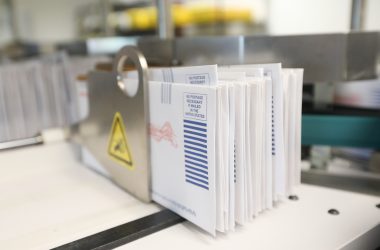
Angel Gallardo takes two Chromebooks from instructional assistant Marissa Vraafladt during a distribution event at McKay High School on Thursday, April 2. (Amanda Loman/Salem Reporter)
NOTE: Salem Reporter is providing free access to its content related to the coronavirus as a community service. Subscriptions help support this.
Parents and students caused an hours-long traffic jam on Northeast Lancaster Drive Thursday as they lined up in cars to pick up Chromebooks.
Security guards from the Salem-Keizer School District and at least one Salem police officer directed cars turning off of Lancaster and zig-zagging across the sprawling parking lot for the district’s largest high school.
A separate line of families who walked up waited, using parking space lines and hula hoops as markers for maintaining at least six feet between groups.
The laptops, available free to any Salem-Keizer student, are part of a plan to transition kids in Oregon’s second-largest school district to remote classes in coming weeks.
Any student could pick one up Thursday and the effort will be repeated again Friday, from 8 a.m. until 12:30 p.m., at all six high schools.
The scenes were another indication of how life has changed dramatically for Salem and its people. Schools were ordered closed effective March 16 in a statewide drive to slow the spread of the novel coronavirus. They are now scheduled to open April 28 but that date seems to be likely to slip and schools aren’t likely to open again this school year.
As a result, teachers are expected to soon conduct class online. To do that, school officials had to find a way to get computers into the hands of students who otherwise couldn’t participate.
The result Thursday was traffic jams around all the high schools.
At McKay, people were lining before the giveaway started. Some parents came alone, while others waited for over an hour in cars packed with their children.
Yolanda Macias got to McKay High School at 11:30 a.m. Thursday, a half hour before teachers began passing out the laptops, “thinking that was early.” By 12:15 p.m., she’d neared the front of the line.
Macias planned to grab laptops for her three children only, but as she inched forward around the school parking lot, she heard from family members hoping she could pick up computers for their kids too. By the time she reached the far end of the school parking lot, she had a list of eight student ID numbers – her own kids, plus nieces and nephews.
She said she hadn’t expected such a level of chaos, but on reflection wasn’t surprised.
“Everybody was crazy over toilet paper. Why wouldn’t they be crazy for their kids’ education?” she said.
Abdi Rahman Abdi waited in the walk-up line with his four children, elementary and middle school students. He said as a parent he’s been frustrated with the lack of a clear plan for ongoing education and is concerned students won’t learn as well online.
“This is a new experience for us,” he said, meaning parents, students and teachers.
Rahman Abdi said his family is from Somalia, and he works in a family grocery store in Portland. Though he speaks English well, Somali is his first language, and he can’t always help his kids with their homework when he doesn’t understand the material.
Supervising schoolwork when he still has to go to work will be difficult too. He said he’s worried about their education.
“This is their right,” he said.
 Instructional assistant Kelly Peterson hands out Chromebooks to the families of students at McKay High School on Thursday, April 2. (Amanda Loman/Special to Salem Reporter)
Instructional assistant Kelly Peterson hands out Chromebooks to the families of students at McKay High School on Thursday, April 2. (Amanda Loman/Special to Salem Reporter)
Angel Gallardo waited in a van with his daughter and three sons. He has two more children at home, he said.
Nearly three weeks without school has been fun for the kids.
“They’re in heaven right now,” he said.
But as a parent, it’s more stressful. He works doing home remodeling, so like many, he’s out of work as efforts to contain the coronavirus have stopped many non-essential businesses. The family has internet at home, but no computers, only cell phones.
With the Chromebooks, “I think it’s going to be much better,” he said.
Elsewhere in Salem, more changes to routines took hold.
Cashiers stood behind newly installed sheets of glass at the checkout line inside Roth’s Fresh Markets in west Salem to limit direct contact with shoppers.
Downtown, drivers were free to park as long as they wanted without parking fees, but there are fewer places to park after the city closed the Chemeketa and Marion Parkades and less businesses to patronize.
The city is continuing to enforce the recently installed 15-minute parking spaces for food pickup, handicap spaces and loading zones.
Cherriots buses were notably absent from city streets after the transit agency shut down service Tuesday following the news that seven employees had tested positive for COVID-19. More than 80 employees had called in sick since March 13.
No other public transit operator in the state has taken such a drastic step as closure.
And Thursday produced more bleak economic news as new state figures showed that the 92,700 Oregonians filed for unemployment, a new record.
Businesses are preparing for infusions of cash from both local and national governments. SAIF, the state’s nonprofit workers’ compensation company, announced a $10 million fund to help businesses buy cleaning supplies or redesign work spaces to encourage social distancing.
On Wednesday, the Marion County Board of Commissioners voted to distribute $200,000 in lottery funds to help small businesses.
The funds will be distributed by Willamette Workforce Partnership, a government-funded workforce development nonprofit.
The grants will be limited to $5,000 and will go to businesses with five employees or less. The grants will target welders, farmers, barbers and other businesses that may not have relationships with banks or other lenders.
During the meeting, Commissioner Kevin Cameron noted that barbers had been particularly hard hit as a result of the closure of businesses that require close contact. He added that he needed a haircut.
“You look fabulous,” Commissioner Colm Willis quipped.
Kim Parker-Llerenas, the partnership’s executive director, said in an email that they will have applications open next week.
Businesses and governments are preparing for the floodgates on the $2 trillion economic stimulus package passed by Congress. State leaders have signaled that they would wait to review the details of the package before calling the Oregon Legislature into special session to approve the state’s version of an economic rescue plan.
Despite two press releases issued Thursday from two of the state’s top political leaders, there is no announced date to call the Legislature back for a coronavirus-focused special session.
Gov. Kate Brown said in a statement that her office is reviewing the details of the recently passed federal relief stimulus package to see what gaps remain before legislators to Salem.
House Speaker Tina Kotek suggested convening the state Emergency Board, a panel of lawmakers authorized to make expenditures when the Legislature is not in session.
“I will work to get more support to Oregonians through Emergency Board funding,” she said. “I urge my colleagues to support this effort and find ways to make sure no Oregonian falls through the cracks during this crisis.”
But Senate President Peter Courtney said that the Legislature isn’t ready for a special session or for a meeting of the Emergency Board. He said that before either can be convened, there needs to be bipartisan consensus on what will be voted on.
“Special sessions require a unique coming together, or it’s a disaster,” he said.
Other governments kept their lights out.
Salem City Council isn’t meeting on Monday, April 13 because there’s a lack of urgent business needing council action, said city spokeswoman Kathy Ursprung. The council plans to meet on April 27 and still limit the number of people in the audience and only accept public comment in written form.
The Marion County Circuit Court building on 100 High St. N.E. is still open for business, but most court hearings are done by phone.
People wanting to talk to a facilitator or to the probate division can continue to stand behind glass to speak to someone in the building, but those wanting a restraining order will have to call in to the courtroom for their hearing.
On Monday, James Bravo-Miranda will go to trial for allegedly assaulting someone with a knife. The court has limited trials to defendants who are in custody and have a constitutional right to a speedy trial.
The court is calling more jurors than it normally would, because people in high-risk categories like those with medical conditions are automatically excused from the jury.
Trial Court Administrator Linda Hukari said potential jurors may also have difficulties finding childcare now that schools have switched to distance learning for the remainder of the school year.
Contact reporter Rachel Alexander: [email protected] or 503-575-1241.









